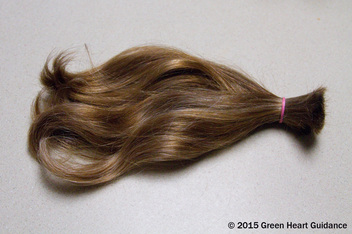 donated ponytail from my haircut in March 2015
donated ponytail from my haircut in March 2015
Old age is the verdict of life. ~Amelia Barr
A recent ad on Pinterest reads, “Fast fix for gray hair.” This simple statement implies that gray hair is broken or wrong in some way and needs to be fixed, yet gray hair is natural. In men, it’s often a sign of distinguishment and age, but for women, it’s a problem to be fixed. Why does our society promote this double standard between the sexes? I certainly don’t have the answer, but I know the societal problem is real and extremely widespread.
I got my first gray hair when I was pregnant with my youngest at age 28. I was standing in the master bathroom when I spied it in the mirror. My then-husband walked in the room, and I asked him, “Is that a gray hair?” He looked carefully, and then walked back out of the bathroom without saying a word. That gave me my answer! I talked about it with my midwife and her intern at my next visit. They confirmed for me that yes, it was a gray hair. The midwife asked me when my mother got her first gray hair. I had no idea. I told her that my mother dyed her hair with the awful-smelling toxic ammonia-based hair colors for as long as I could remember. My midwife pointed out that that was my answer as to when she first started going gray.
Twelve years later, I have a lot more than just one gray hair. My photos don’t often show the gray as it still blends well, but in person, there’s no missing it. My chemical sensitivities prevent me from dyeing my hair because even the natural dyes often contain less than tolerable ingredients for the chemical sensitive. I’m sure I’d look ridiculous with henna, too. But the bottom line isn’t that I can’t dye my hair: It’s that I don’t want to. My gray hairs are part of whom I am. They’re a mark of age. They show that I’m human. I’ve earned every one of those gray hairs, and I don’t want to get rid of them even if I could dump chemicals on my head.
Society isn’t as kind about gray hairs. I only have a few friends who don’t think that dyeing their hair is mandatory. They don’t want to look older than they are. These normally green living women aren't willing to face the way they look. They bow to society’s pressure to try to look younger than they really are. In the dating market especially, looking older is not considered a benefit for a middle-aged woman. Even though some of these friends are financially strapped, they still find the money for touch ups every three weeks along with regular coloring sessions. It’s not something they consider optional or a luxury.
I think a lot of the fear behind gray hairs eventually trickles down to a fear of dying. The older we get, we get closer to death at least according to a statistical perspective. For me, worrying about death seems kind of pointless. It’s going to happen whether we want it to or not. Rather than worrying about dying, I’d rather focus on living. Now that I’m almost 41, living with gray hairs doesn’t seem like a bad thing. Instead, it seems to be a privilege, a symbol of survival. One of my most recent past lives ended at the age of 23 or so, though I managed to pack a lot of living into those years. However, given the option, a few gray hairs don’t seem like that high of a price for a longer life!
When our society as a whole stops seeing gray hairs as something to be fixed, a lot will change. We will begin accepting ourselves and each other for who we actually are. Superficial things like hair color will no longer matter as we pick mates or apply for jobs. I'm not sure which will be the cause and which will be the effect in terms of gray hairs being seen normal and greater acceptance at large, but I look forward to a day when our culture has evolved enough to accept people exactly as they are, beautiful in their own ways.
© 2015 Elizabeth Galen, Ph.D., Green Heart Guidance, LLC
 RSS Feed
RSS Feed